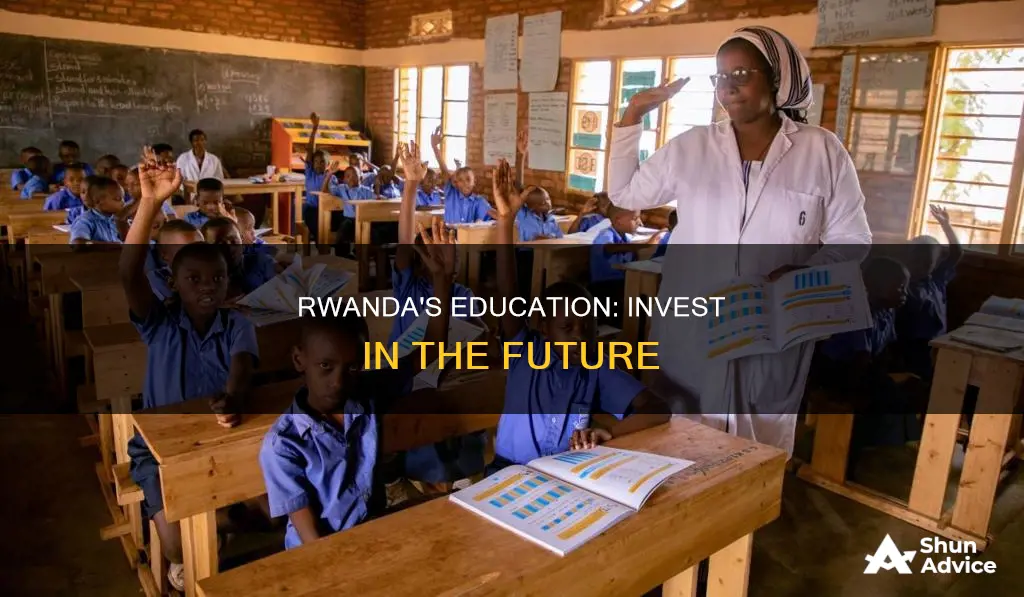
Rwanda has made significant progress in its education sector, especially after the 1994 Genocide against the Tutsi. The country has been recognised as one of the top-performing countries in sub-Saharan Africa in terms of access to education, with a net enrolment rate of 97.7% in 2016. However, there is still a need to improve the quality of education to produce a highly skilled workforce capable of competing in the global market. The Rwandan government has made education a priority, recognising that raising educational attainment levels are crucial for the country's economic prosperity. The government aims to transform Rwanda into an upper-middle-income country by 2035 and a high-income country by 2050. To achieve these goals, the Rwandan people must be equipped with the knowledge, skills, and attitudes necessary to contribute to the country's social and political life.
Investing in Rwanda's education sector is crucial to support the country's ambitious development objectives and to build a knowledge-based economy. By improving the quality of teaching, enhancing infrastructure, and promoting equitable access to education, Rwanda can ensure that its citizens have the skills needed to drive economic growth and development.
| Characteristics | Values |
|---|---|
| Current state of the education system | Rwanda has made good progress in the education sector, especially after the 1994 Genocide against the Tutsi. In 2016, Rwanda was named one of the top-performing countries in sub-Saharan Africa in education, with a net enrolment rate of 97.7%. However, there is a need to improve the quality of education, as many children are not equipped with foundational skills upon completing primary education. |
| Government priorities | The Rwandan government has made education a priority sector to support its ambitious development objectives and grow a knowledge economy based on an educated workforce. It aims to transform the country into an upper-middle-income country by 2035 and a high-income country by 2050. |
| Investment opportunities | There are various investment opportunities in Rwanda's education sector, including infrastructure development, introducing new programs, digital content development, teacher training, and foreign universities opening campuses in the country. |
| Incentives | The Rwandan government offers incentives such as a corporate income tax holiday of up to 7 years for investments of at least 50 million USD, accelerated depreciation rates, and exemptions on VAT for imported Technical and Vocational Education training materials. |
| International support | Rwanda has received significant support from organisations like the World Bank, which allocated $200 million to boost basic education, and the Global Partnership for Education, which provided grant support of US$304,155,025. |
| Challenges | Challenges include low enrolment rates, limited resources, high repetition and dropout rates, and inadequate infrastructure. Additionally, there is a shortage of qualified teachers, with about 40% of teachers having less than five years of experience. |
What You'll Learn
- To create a highly-skilled workforce capable of competing in the global job market
- To improve the quality of education and address issues like low teacher competency and high dropout rates
- To increase access to education, especially for vulnerable children and those in rural areas
- To promote gender and disability inclusion in schools
- To support Rwanda's ambitious development objectives and transition to a knowledge-based economy

To create a highly-skilled workforce capable of competing in the global job market
Rwanda's government has made education a priority, recognising that raising educational attainment is crucial for the country's economic prosperity. The country's development strategy prioritises science and technology education, ICT skills, and vocational and technical training in the fields of technology, engineering, and management. The aim is to develop human capital and turn Rwanda into a "sophisticated knowledge-based economy".
To achieve this, there are several key areas that require investment. Firstly, teacher training and recruitment need to be enhanced to ensure that educators are highly trained, skilled, and passionate about teaching. This includes improving teachers' English proficiency and digital literacy skills, as well as providing training in learner-centred and inclusive pedagogies. Secondly, infrastructure development is necessary, particularly in addressing overcrowding in schools and constructing more classrooms and student hostels. Thirdly, introducing new programs that are closely connected to the labour market will help ensure that graduates have the skills needed to compete globally. Finally, investment in digital content development and foreign partnerships in education will expose students to international standards and best practices.
By investing in these areas, Rwanda can create a highly-skilled workforce that is capable of competing in the global job market and driving the country's economic development.
Diversifying Savings: Beyond Stocks and Bonds
You may want to see also

To improve the quality of education and address issues like low teacher competency and high dropout rates
Rwanda has made education a priority sector to support its ambitious development objectives and grow a knowledge economy based on an educated workforce. The country has committed to providing quality education for all children, including free basic education and a competence-based curriculum.
However, there are challenges that need to be addressed to improve the quality of education and retain students throughout their schooling. These include:
- Low teacher competency: Teachers in Rwanda lack the skills to teach effectively, particularly in using student-centred pedagogies and teaching in English, the official language of instruction.
- Lack of educational materials and infrastructure: Schools in Rwanda often lack the necessary educational materials and infrastructure, such as classrooms and teaching aids, to provide a quality education. This is especially true for children with disabilities, who may require specialised resources and inclusive infrastructure.
- High dropout rates: The dropout rate in Rwanda, particularly among girls, is high, with many students leaving school before completing their primary education. This is due to various factors, including family circumstances, community influences, and school-related issues.
To improve the quality of education and address these issues, several interventions can be implemented:
- Improve teacher training and development: Invest in ongoing professional development programmes that equip teachers with the necessary skills and knowledge to teach effectively, such as student-centred pedagogies, inclusive education practices, and digital literacy.
- Address socioeconomic factors: Work with families and communities to address the root causes of school dropout, such as household poverty, parental involvement, and social norms that discourage education, especially for girls.
- Enhance educational resources and infrastructure: Provide schools with the necessary educational materials and infrastructure, such as classrooms, teaching aids, and inclusive resources for children with disabilities, to create a more conducive learning environment.
- Implement remedial and support programmes: Establish remedial learning programmes and support services to help struggling students, especially those at risk of dropping out, to catch up and stay in school.
- Improve school governance and management: Strengthen the capacity of the education sector to effectively manage and support schools, including collecting and using data on gender and disability to inform policy and practice.
- Promote gender equity: Develop and implement policies and programmes that promote gender equity in education, addressing social norms and traditions that disadvantage girls and hinder their access to education.
Shiba Investors: A Community's Power
You may want to see also

To increase access to education, especially for vulnerable children and those in rural areas
Rwanda has made significant progress in terms of access to education, with a net enrolment rate of 97.7% in 2016. However, equitable access remains an issue, especially for vulnerable children. To increase access to education for vulnerable children and those in rural areas, there are several key areas that require investment and improvement.
Firstly, early childhood education needs to be more accessible. This includes constructing more pre-primary classrooms to increase enrolment and developing early identification programmes for children with disabilities. By starting children's education early, they will be better prepared to learn throughout their schooling.
Secondly, the issue of overcrowding in schools needs to be addressed. Overcrowded classrooms hinder learning and can be uncomfortable and distracting for students. Building more classrooms and schools, particularly in rural areas, will help to reduce overcrowding and ensure that all students have access to a quality education.
Thirdly, teacher training and recruitment need to be improved. There is a need for more qualified teachers, especially in rural areas. Investing in teacher training programmes and offering incentives to attract teachers to rural areas will help increase access to education for all children.
Finally, investment is needed to improve school infrastructure and resources, particularly in rural areas. This includes providing schools with basic necessities such as toilets, tap water, and electricity. Additionally, supplying schools with computers and internet connectivity will help ensure that all students have access to the same educational tools and resources.
By addressing these issues and increasing access to education for vulnerable children and those in rural areas, Rwanda will be closer to achieving its goal of becoming a knowledge-based economy with a skilled workforce.
Seeking Investors for Your Farm?
You may want to see also

To promote gender and disability inclusion in schools
Rwanda has made significant progress in promoting gender and disability inclusion in schools. The country is currently ranked sixth in the world for ensuring equality between men and women, and women hold 64% of seats in the lower house of the national legislature, the largest share of any country globally.
To further promote gender and disability inclusion in schools, the following measures can be implemented:
Enhance gender integration and inclusivity:
This involves engaging various stakeholders, including teachers, community members, potential employers, and government officials, to challenge "traditional" beliefs and patriarchal social structures that limit the power of girls and women. Successful projects like "Let's Read" have engaged men in rural communities to encourage parents' participation in their children's education, helping to reduce absenteeism and increase participation in extracurricular activities.
Promote gender equality in teaching materials:
Gender experts have worked with the Rwandan government to create textbooks and learning materials that promote gender equality. These materials depict scenes of boys and girls sharing responsibilities equally, empowered women and girls, and children with disabilities who can learn.
Implement inclusive education programs:
Projects like "Get Trained and Let's Work!" provide training and job placement opportunities for youth with disabilities, offering access to jobs for some of the country's most marginalized groups. These programs also address challenges such as childcare and transportation for participants, ensuring their safe participation.
Raise awareness of gender issues:
USAID and its Rwandan education partners are working with government and local officials, gender experts, disabled persons' organizations, parents, and teachers to raise awareness of gender issues and integrate best practices throughout the education sector. This includes addressing the root causes of exclusion, such as inequality in resource distribution and social norms that perpetuate differences.
Improve education sector management:
By enhancing the collection and use of gender and disability data, Rwanda can better serve all students, including the most vulnerable. This data-driven approach will help identify challenges and inform decision-making at different levels, from governments to teachers and families, to promote inclusive and gender-transformative education.
Fear of Investing: Why the Hesitation?
You may want to see also

To support Rwanda's ambitious development objectives and transition to a knowledge-based economy
Rwanda has made education a priority sector to support its ambitious development objectives and transition to a knowledge-based economy. The country's development strategy prioritises "science and technology education and ICT skills," and emphasises "vocational and technical training in the fields of technology, engineering and management" to develop human capital.
Rwanda's commitment to providing quality education for all children includes the introduction of free basic education and a competence-based curriculum. The uptake of primary education is high, with net enrollment nearing 99%. However, upon completing primary education, many children lack foundational skills. To address this, Rwanda is working with partners like the Global Partnership for Education (GPE) to improve inclusive quality teaching and learning. Measures include boosting foundational literacy and numeracy, enhancing education sector management, and improving teacher competency.
The World Bank has allocated $200 million to improve teacher effectiveness by enhancing English proficiency and digital literacy skills, supporting the professional development of STEM teachers, and strengthening teacher recruitment and deployment. Additionally, 11,000 furnished classrooms and 14,500 gender-segregated latrines will be built to address overcrowding in schools.
Foreign universities are encouraged to open campuses in Rwanda, with an emphasis on STEM. There are also opportunities for private investment in constructing and managing student hostels and supplementing scholarship provisions.
Rwanda's vision to become a knowledge-based economy requires a strong human capital base. By investing in education, the country can develop the skills and knowledge of its people to support its transition to a middle-income economy and achieve its ambitious development objectives.
Stash Investing: Millions of Users
You may want to see also
Frequently asked questions
Rwanda's government has made education a priority, recognising that raising educational standards is crucial for the country's economic prosperity. The country has ambitious development objectives and aims to become a knowledge-based economy.
Rwanda has made significant progress in terms of access to education, with high primary education uptake and near-universal enrolment. However, there is a need to improve the quality of education to ensure that students are equipped with foundational skills.
Challenges include limited resources, low enrolment rates in secondary and higher education, and a lack of qualified teachers, particularly in secondary schools. There is also a need to address issues such as overcrowding in schools and early childhood education to ensure that all children have equal access to quality teaching.
Various measures are being implemented to improve the quality of education, including teacher training initiatives, infrastructure development, and the introduction of new programs that are closely connected to the labour market. There is also a focus on boosting foundational literacy and numeracy, enhancing the school environment, and promoting the use of technology in education.
Foreign investment can play a crucial role in supporting the development of Rwanda's education sector by addressing key challenges and helping the country achieve its ambitious development goals. Investment opportunities include infrastructure development, digital content creation, teacher training, and the establishment of foreign university campuses, among others.







